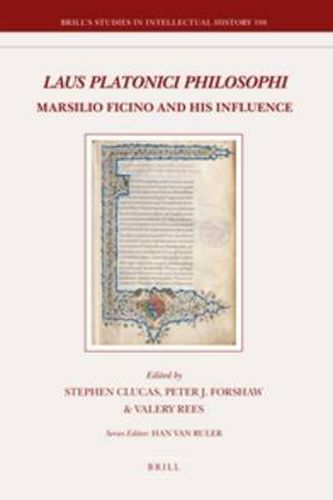Readings Newsletter
Become a Readings Member to make your shopping experience even easier.
Sign in or sign up for free!
You’re not far away from qualifying for FREE standard shipping within Australia
You’ve qualified for FREE standard shipping within Australia
The cart is loading…






This collection of essays honours Marsilio Ficino (1433-1499) as a Platonic philosopher. Ficino was not the first translator of Plato in the Renaissance, but he was the first to translate the entire corpus of Platonic works, and to emphasise their relevance for contemporary readers. The present work is divided into two sections: the first explores aspects of Ficino’s own thought and the sources which he used. The second section follows aspects of his influence in the sixteenth and seventeenth centuries. The papers presented here deepen and enrich our understanding of Ficino, and of the philosophical tradition in which he was working, and they offer a new platform for future studies on Ficino and his legacy in Renaissance philosophy.
Contributors include: Unn Irene Aasdalen, Constance Blackwell, Paul Richard Blum, Stephen Clucas, Ruth Clydesdale, Brian Copenhaver, John Dillon, Peter J. Forshaw, James Hankins, Hiro Hirai, Sarah Klitenic Wear, David Leech, Letizia Panizza, Valery Rees, and Stephane Toussaint.
$9.00 standard shipping within Australia
FREE standard shipping within Australia for orders over $100.00
Express & International shipping calculated at checkout
This collection of essays honours Marsilio Ficino (1433-1499) as a Platonic philosopher. Ficino was not the first translator of Plato in the Renaissance, but he was the first to translate the entire corpus of Platonic works, and to emphasise their relevance for contemporary readers. The present work is divided into two sections: the first explores aspects of Ficino’s own thought and the sources which he used. The second section follows aspects of his influence in the sixteenth and seventeenth centuries. The papers presented here deepen and enrich our understanding of Ficino, and of the philosophical tradition in which he was working, and they offer a new platform for future studies on Ficino and his legacy in Renaissance philosophy.
Contributors include: Unn Irene Aasdalen, Constance Blackwell, Paul Richard Blum, Stephen Clucas, Ruth Clydesdale, Brian Copenhaver, John Dillon, Peter J. Forshaw, James Hankins, Hiro Hirai, Sarah Klitenic Wear, David Leech, Letizia Panizza, Valery Rees, and Stephane Toussaint.